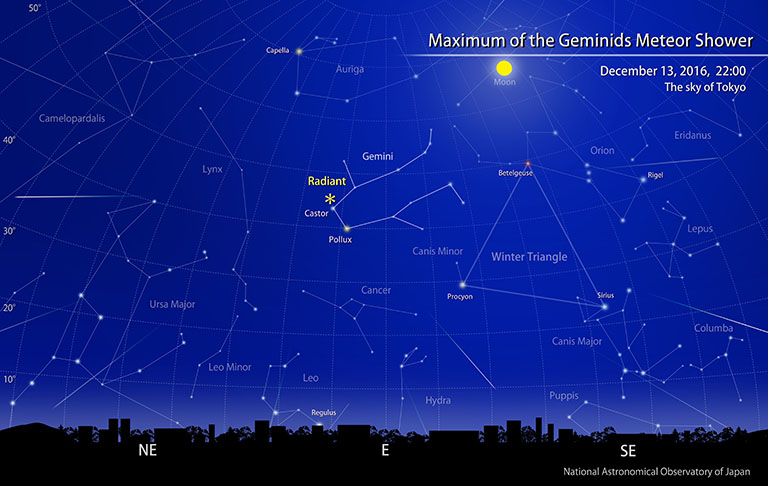Astronomical Events Information | 2016 | December
Peak of the Geminid Meteor Shower
Let’s Look for Meteors too Bright to Lose to the Moonlight!

The Geminids are a meteor shower whose activity is centered around December 13 and 14 each year. This meteor shower exhibits a steady appearance each year, with the special characteristic that meteors appear all night long, making it ideal for people who want to observe their first meteor shower. It is known as one of “the 3 Major Meteor Showers,” along with the Quadrantid meteor shower in January and the Perseid meteor shower in August. In a location with a dark sky where a wide expanse of the sky can be seen, more than 40 meteors per hour can be observed some years. But this year we shouldn’t expect to observe many meteors because conditions for the Geminid meteor shower are bad for 2 reasons. The first reason is because the peak (note) of the Geminid meteor shower is predicted to be around 9:00 on the 14th, a time that is during the day in Japan. The second reason is that the 14th is a full moon, so bright moonlight has an effect all night long, making it difficult to see dim meteors. From Japan, the Geminids can be observed starting from 22:00 on the 13th, when the elevation of the constellation Gemini rises sufficiently high, until dawn on the 14th. On the order of 10 meteors per hour are expected.
However, as opposed to most meteor showers where many meteors appear only after midnight, the Geminids start from a relatively early time, making it a meteor shower that can be observed without difficulty and enjoyed by the entire family, from young children to elders.
This is a very cold season, so please take proper precautions against the cold when observing.
(note) The “peak” of meteor shower activity indicates the maximum activity of the meteoric swarm itself and the time when this maximum activity occurs.
For more information about what kind of phenomena meteor showers are, please refer to “What is a Meteor Shower?” For more information about the Geminid meteor shower, please refer to “The Geminid Meteor Shower” (Japanese only)
- What is a Meteor Shower? (Japanese only)
- The Geminid Meteor Shower (Japanese only)